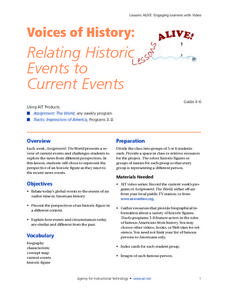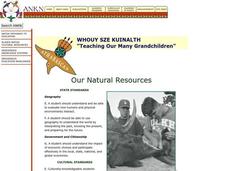Curated OER
A Stinking Smelly Sewer
Students create a timeline of events that occurred in the Nashua River Valley as presented in the book, "A River Ran Wild." They write a description of a selected time period on an index card for a class timeline, and write a letter to...
Curated OER
Critical Analysis Leads to Global Action
Students discover the interconnectedness of the world. In this global studies lesson, students identify challenges the world faces and craft solutions to the problems they identified. Students present their findings in a PowerPoint...
Curated OER
Voices of History: Relating Historic Events to Current Events
Learners discuss the current events affecting the country today. In groups, they relate a historical event to a current event. They research and present the point of view of a historical figure in an interesting way. They compare and...
Curated OER
Nutrition for Kids...and Astronauts
Second graders, in grades 2 and 5, cooperate to create a PowerPoint presentation about nutrition and food. They have a feast culminating the project and invite parents.
Curated OER
Heavens Above
Students study the stars and their positions. In this astronomy lesson students see how scientists can predict the positions of the stars and can tell how they would have appeared in the past.
Curated OER
Remember
Seventh graders mention any recent racism or discrimination they have seen placed on an ethnic group other than their own. After reading an autobiography, they read and write poems based on past events in the Hispanic culture. They are...
Curated OER
PLATE MOVEMENTS AND CLIMATE CHANGE
Young scholars label three geological maps with continents provided to analyze the relationships between the movement of tectonic plates and the changes in the climate. In small groups, they discuss their findings and form hypotheses...
Curated OER
"Weather" or Not?
Students complete a three week unit about weather and how it affects our behavior. They read and discuss various books related to weather, conduct an experiment about the tilt of the earth, plan a field trip based on temperature,...
Curated OER
Where Have All the Endangered Gone?
Students explore animals that are endangered. They choose an endangered animal that they would like to keep from becoming extinct. Students create a persuasive presentation to persuade someone to understand why they feel keeping their...
Curated OER
Our Natural Resources
Students discuss key terms used to describe ecosystems and how humans are altering natural resources. They listen to the book, Grandfather's Wisdom, and list the renewable and nonrenewable resources they have used or consumed in the past...
Curated OER
Ecological Relationships
Students identify ecological elements and their factors on species, populations and food webs. They analyze ecosystems for these elements and research how these factors influence species survival rate. Predictions on conditions over time...
Curated OER
Physical Science: Solar Energy
Young scholars review and discuss how Solar energy and electricity produce light and heat. They create a photo/picture journal and include pictures taken during solar energy activities to a PowerPoint slide presentation.
Curated OER
Health and Wellness
Students exercise without being in a big group. They have freedom of movement, learn particular body part at same time promote health, and enjoy exercising at a early age.
Curated OER
Rectangle
In this geometric shape worksheet, learners trace one large example of a rectangle. On primary lines, students trace a dotted word "rectangle" one time.
Curated OER
Exploring Indiana: Tales, Timelines, and Trivia
Students record timelines of Indiana history and include events from their own personal history on it. After using various research sources, the record their timelines using the Timeliner software application. They share their timelines...
Curated OER
Post Office Stamps
Young scholars research and analyze how communication has changed over time. They chart communication developments on a timeline, and create commemorative stamps depicting forms of communication.
Curated OER
Colonial Flag
Students examine the reasons for and the results of the US Revolutionary War. They watch a PowerPoint presentation to review the immediate results of the war. They design a flag for the newly free colonies.
Curated OER
Phases of the Moon
Sixth graders observe the changes in the moon's appearance over a two week period of time from their homes. They record and illustrate their observations and also complete daytime moon viewings as a class.
Curated OER
Chicago Rhythms, Chicago Roots
High schoolers view a video about different types of music. They examine the history of jazz, big band and rock back to the city of Chicago. They discover Chicago's music scene today and compare it to the past.
Curated OER
Socializing at Work
Students practice social conversation using adjectives and phrases describing good and bad weather. They review the present perfect continuous, present continuous, past continuous and future continuous tenses.
Curated OER
Honoring Leaders
Students design and compare monuments that honor an imaginary Roman emperor and a future American president. They explain how the monuments reflect the attributes of the person being honored.
Curated OER
Technological Developments
First graders discuss household tasks, and identify differences between how things are done now, and how they were done when their parents and grandparents were little. Students then predict how tasks will change in future, and visit...
Curated OER
The Russian View of Territorial Encroachment
Twelfth graders produce a map illustrating the current NATO members, future nations, and nations that have applied for membership. They research current information regarding NATO, and the Russian viewpoint about the expansion of NATO....
Curated OER
The Study of the Spanish-Speaking People of Texas: Daily Life
Young scholars analyze the different ways that photography helps historians understand the lives of people who lived in the past. They examine images from Russell Lee's photo essay and discuss how Texas' has changed from an agrarian to...























